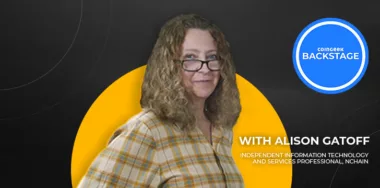Ira Kleiman’s latest bid to relitigate his failed civil suit against Dr. Craig Wright contains a lot of rehashed info and one brand new whopper of a claim.
On August 17, Ira Kleiman’s attorneys filed an appeal with the U.S. Court of Appeals for the Eleventh Circuit, seeking a fresh trial against Dr. Wright over certain assets that Ira maintains were jointly owned by Wright and Ira’s half-brother Dave Kleiman, a close friend and occasional business partner of Dr. Wright’s before Dave died in April 2013.
The appeal is based on Ira’s camp’s recognition that Wright is the real-world figure behind the Satoshi Nakamoto pseudonym credited with authoring the 2008 Bitcoin white paper. Ira, who was left in charge of Dave’s estate, filed his original suit in February 2018, seeking half of the 1.1 million Bitcoin tokens that Ira alleges were jointly mined by Wright and Dave, as well as various other intellectual property Ira maintained the two friends jointly possessed.
Wright has denied that he and Dave had a partnership to mine Bitcoin. Wright always credited Dave with helping him edit the white paper’s early drafts, based on Wright’s view that Dave “could edit his way through hell and back,” but that’s where Dave’s contributions concluded.
Wright also contends that he is not a trustee of the trust he founded and, as such, does not have control of any of the Bitcoin addresses. Ira has not attempted to challenge this finding or approach the corporate management of the trust. Rather, Ira continues to make unsupported allegations that Wright must be a trustee and does this without evidence.
In December 2021, following a 21-day trial, Wright was declared the victor on six of seven counts. The jury did find that Wright improperly converted assets from W&K Info Defense Research LLC, a company founded by Wright and Dave, to other companies in which Wright had partial control.
While the jury ordered Wright to pay $100 million to W&K (more on this Pyrrhic victory below), the result was hardly the billions in Bitcoin that Ira (and his financial backers) expected to win. So in January 2022, Ira filed a motion for a new trial, which the U.S. District Court for the Southern District of Florida rejected in February, finding Ira’s attorneys’ arguments “unpersuasive and insufficient to warrant a new trial.”
Undaunted, Ira and his backers are now back for another kick at the can, one level up the federal court food chain. Their arguments this time around are largely the same as the ones that failed in February—leading Wright’s attorney Andrés Rivero to call this latest filing “a rehash of losing arguments”—but there is one new claim that stretches Ira’s already paper-thin credibility to its logical breaking point.
Three-ring circus
The appeal is structured around three points. First, the District Court allegedly erred by instructing the jury on how partnerships are defined, using an old law that was supplanted by a 1996 law that greatly simplified this determination. Ira’s estate claims the use of the old law forced it “to prove things it should not have been required to prove.”
Secondly, Ira’s camp claims that District Court Judge Beth Bloom erred in vacating the sanctions imposed by U.S. Magistrate Judge Bruce Reinhart (he of the Jeffrey Epstein connection and Mar-a-Lago search warrant infamy) ahead of the Florida trial. Reinhart found fault with Wright’s perceived failure to comply with his responsibilities in pre-trial discovery, including providing a complete list of the Bitcoin addresses under his control.
Bloom vacated the sanctions based on her view that sanctions need to “specifically relate to the discovery issue that was pending” or to “cure” the discovery abuse by establishing the specific facts at issue in the discovery ordered by the court. In essence, Bloom felt these issues were better handled in a courtroom in front of a jury. Ira’s camp calls Bloom’s decision “an abuse of discretion” that “misunderstands the relevant evidence, and bases its decision upon considerations having little factual support.”
Thirdly, Ira’s camp takes issue with the fact that, once Ira was on the witness stand, Wright’s attorneys repeatedly brought up the fact that he was effectively estranged from Dave. Ira has admitted not seeing Dave in person for nearly four years before his death, and never once visited him in the Veteran Affairs hospital in Miami, despite the proximity of the hospital to Ira’s residence and the fact that Dave’s agonizing final stay in the hospital lasted nearly two-and-a-half years.
Ira’s camp claims Wright’s strategy was to paint Ira as “an undeserving plaintiff” and that discussion of Ira’s evident disinterest in seeing his brother had “severely” prejudiced Ira’s chances of prevailing at trial. Ira’s attorneys also point out that there was a motion in limine that was supposed to exclude discussion of Ira’s habitual arms-length approach to Dave (at least, until Ira discovered that there might be a big payday in it for himself).
On a personal note, we had to chuckle at the appeal’s claim that this ‘undeserving’ narrative was “extensively explored in media coverage” and thus would have been evident to the jury as well. Incredibly, of the seven reports cited in the appeal, five are produced by CoinGeek (four articles, one video). Thanks for the shout-out, guys!
Call me maybe
It’s the third plank of the appeal that deserves more focus, mainly because of Ira’s attorneys’ claim that “the relationship Wright tried to paint as estranged was a multifaceted relationship with strong positive aspects as well. For example, Ira was very often in touch with David while the latter was in the hospital, including more than 100 phone calls between the two just during David’s final hospitalization.”
It’s a bit of a bombshell, this claim of ‘more than 100’ calls during Dave’s last stand at the VA hospital. For one thing, Dave discharged himself from the hospital for the last time in the latter half of March 2013, about a month before his death, while Ira stated in his April 8, 2019, deposition that “the last time I spoke with [Dave] would probably be sometime late 2012.” So, not one of these 100 phone calls occurred during the last six months or so that Dave was in hospital.
There’s another section of Ira’s deposition which, while it was subject to the motion in limine, bears repeating here verbatim.
Q. Ira, did you speak to Dave while he was in the V.A. Hospital?
A. think a couple times, yes.
Q. About how many?
A. Don’t remember.
Q. You say less than ten?
A. Maybe.
Let’s be clear: it’s pretty hard to confuse ‘over 100’ calls with ‘less than 10’ calls or even ‘a couple times’ (Ira thinks). If one was typing this, it might be easy to fat-finger an extra zero after ‘10’ but just memory-holing 90% of one’s communications with a dying sibling simply beggars belief.
Ira also previously stated that he was ignorant of the fact that Dave had been hospitalized for over two years straight, saying: “I realized that he would go back and forth to the hospital on a routine basis but as far as him, like, staying for any long period of time, I wasn’t aware of that.” Which begs the question, where exactly did he think Dave was speaking from during these 100+ calls? When Ira heard all those ‘Paging Dr. Braun’ type announcements over the P.A. system, did he really believe Dave was watching General Hospital?
From Ira’s depositions, we know that the subject of these calls apparently didn’t involve any of the following: Dave’s fiancé or other girlfriends, medical issues, financial issues, whether Dave was able to do any work from his hospital bed, the fact that Dave had put Ira in charge of his estate, or anything even remotely resembling Bitcoin (including zero follow-ups on Dave allegedly showing Ira a Bitcoin logo during their final face-to-face meeting in 2009, during which Dave reportedly told Ira that he was working on something that would be ‘bigger than Facebook’).
So exactly what did they talk about during these 100—or 10, or a couple, or possibly zero—calls? According to Ira: “Just, I guess, random stuff. I don’t remember actually.”
During his time on the witness stand, Ira detailed a somewhat bizarre ritual he’s indulged in since Dave’s death. Having gained access to one of Dave’s email accounts, Ira said that he signs into Dave’s account every year on Ira’s birthday and sends himself a ‘happy birthday’ message as if Dave had written it.
Ira’s depositions revealed that at least two of Dave’s phones came into Ira’s possession following Dave’s death. For all we know, Ira has been furiously calling these numbers since the 2021 verdict to restage phone calls he never had with Dave but now wishes he had. Sound outlandish? Sure, but did you read the paragraph right above this one?
Ira’s 100+ call claim reflects how desperate his camp is becoming in collecting on what they originally thought would be an easily corralled cash cow. With that prize looking increasingly unobtainable, Ira’s camp appears to be grasping at straws.
Ill-gotten nothing
There’s no shortage of irony in Ira’s decision to launch yet another hapless request for a new trial, given that immediately after the December 2021 verdict was announced, Ira’s lead attorney Vel Freedman took to Twitter to publicly brag about feeling “incredibly gratified” by the “great win” they’d secured for their client.
Bear in mind that it’s rarely the victor of a legal fight that seeks to appeal the verdict (and continue appealing even after initial appeals are rejected). Also consider that Ira’s legal braintrust turned down a $3 billion settlement offer that was made while the proceedings were still ongoing. Such was their misguided faith in their capacity to produce a victory, a faith no doubt swayed by the prospect of a potential nine-figure payday.
While the jury in the 2021 trial did order Wright to pay $100 million to W&K, that didn’t turn out to be the consolation prize Ira originally thought it was. For one thing, the bulk of W&K is controlled by Lynn Wright, Dr. Wright’s first wife, who was an original W&K partner and to whom Dr. Wright transferred a further portion of the company as part of their 2011 divorce settlement.
Which meant that Dave’s estate was only potentially owed a small portion of that $100 million if anything at all and also raised questions as to Ira’s right to claim to be representing W&K in the suit against Dr. Wright in the first place. Suffice it to say, Ira’s financial backers are likely suffering a lingering case of buyer’s remorse.
The Miami verdict was no doubt a bitter pill to swallow, and not just for Ira, considering the undisguised glee with which much of the ‘crypto’ community anticipated Wright’s comeuppance. That animosity was largely based on Wright’s support for Bitcoin SV (BSV), which honors Bitcoin’s original design as a peer-to-peer electronic cash system with transaction fees measured in fractions of a cent. BSV has the capacity to render all other blockchains redundant, which I suppose would make supporters of these other blockchains eager to see Satoshi strung up by his thumbs.
Perhaps it was knowledge of this prevailing anti-BSV/Wright vitriol that convinced Vel Freedman et al to spend so much of the trial attacking Wright’s character rather than remaining laser-focused on their primary goal, i.e., attempting to steal Satoshi’s tokens and intellectual property on behalf of an undeserving individual backed by a rapacious litigation finance group.
Based on the rehashed arguments and unreal 100+ calls claim in Ira’s latest appeal, it seems unlikely that the Eleventh Circuit appeals court will grant him a new trial. That will leave only the U.S. Supreme Court on Ira’s options list. Perhaps Ira will now start claiming that, when he and Dave were having those 100+ calls, Dave always used to say how Clarence Thomas and John Roberts looked like really swell guys.
New to blockchain? Check out CoinGeek’s Blockchain for Beginners section, the ultimate resource guide to learn more about blockchain technology.








